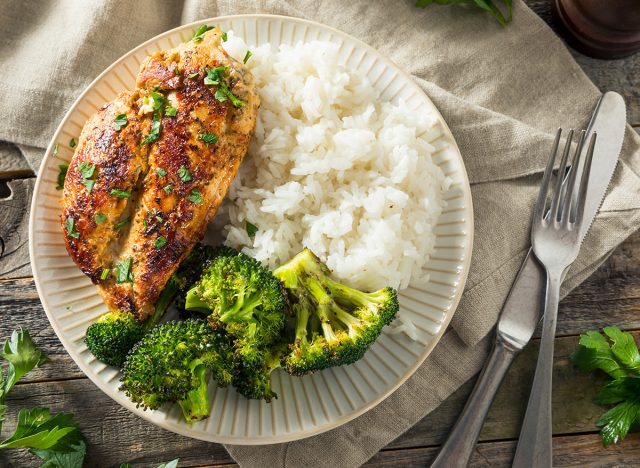7 Ways to Accelerate Your Metabolism Naturally

A healthy metabolism is important not just for weight loss but for overall well-being. "Metabolism can vary greatly from person to person," Linsey High, PA-C tells UnityPoint Health. "For example, two women who are the exact same height and weight can have completely different metabolisms due to many different factors." While there is certainly a genetic factor to take into consideration, lifestyle habits can impact your metabolism for the better and the worse. Here are seven ways to boost your metabolism naturally, according to experts.
Weight Training

Lifting weights is a great way to boost your metabolism and get fit. "Strength training is a key component of overall health and fitness for everyone," says the Mayo Clinic. "Strength training can help you manage or lose weight, and it can increase your metabolism to help you burn more calories."
Good Sleep Habits

Studies show not getting enough sleep can slow down your metabolism, encouraging the body to hold onto fat stores. "The primary problem in obesity is how fat tissue functions to store fat energy," says Greg Shearer, PhD. "By storing fats quickly, fat tissues appear to shift fuel utilization away from fats and prioritize the use of sugars for fuel. Here we show evidence that sleep restriction exaggerates this process, conserving energy stores."
Exercise More

A study from UT Southwestern Medical Center shows even a single workout can boost your metabolism for days, thanks to the impact of exercise on specific neurons. "It doesn't take much exercise to alter the activity of these neurons," says UT Southwestern neuroscientist Dr. Kevin Williams. "Based on our results, we would predict that getting out and exercising even once in a semi-intense manner can reap benefits that can last for days, in particular with respect to glucose metabolism."
Don't Skip Meals

Eat breakfast to help boost your metabolism—but opt for healthy, high-protein choices. "Our energy use slows overnight and is usually lowest in the early morning," High tells UnityPoint Health. "Eating breakfast is an easy way to 'wake-up' your metabolism. People who don't eat breakfast often have several hours of slower metabolism compared to people who do eat breakfast."
RELATED: I Lost 65 Pounds in 2 Years With the Help of Diet and Rowing
Manage Stress

Stress can negatively impact your metabolism, so managing it through methods such as meditation or exercise is very important. "Your body does not know when a stressful situation will end," says Penn Medicine. "To prepare, it saves energy by not burning as many calories, which can lead to weight gain. More commonly, people turn to — or away from — food as a way to help deal with stress. Your metabolism can change if you regularly eat large amounts of food or don't eat enough or at all."
Eat More Protein

Protein helps rev your metabolism thanks to its higher thermic effect. "Swapping out high-carb foods for high-protein foods will increase the amount of energy the body uses to digest food, burning more calories in the digestion process alone," High tells UnityPoint Health. "This is why paying attention to the nutritional content of our foods is so valuable. It's also why junk food, which is typically high-fat and/or carb, is detrimental to our health."
RELATED: 6 Strength Training Moves for Lean Muscle Tone at 60+
Move More

Sitting all day can negatively impact your metabolism. "So much of improving metabolism is understanding what it is you do with most of your time," endocrinologist Dr. Laila Tabatabai tells Houston Methodist. "If you're sitting in front of a computer for eight hours a day only to go home and sit in front of your TV for another two or three, that's certainly going to reduce your metabolic rate."
💪🔥Body Booster: The same healthy habits that lead to weight loss will help boost your metabolism.




